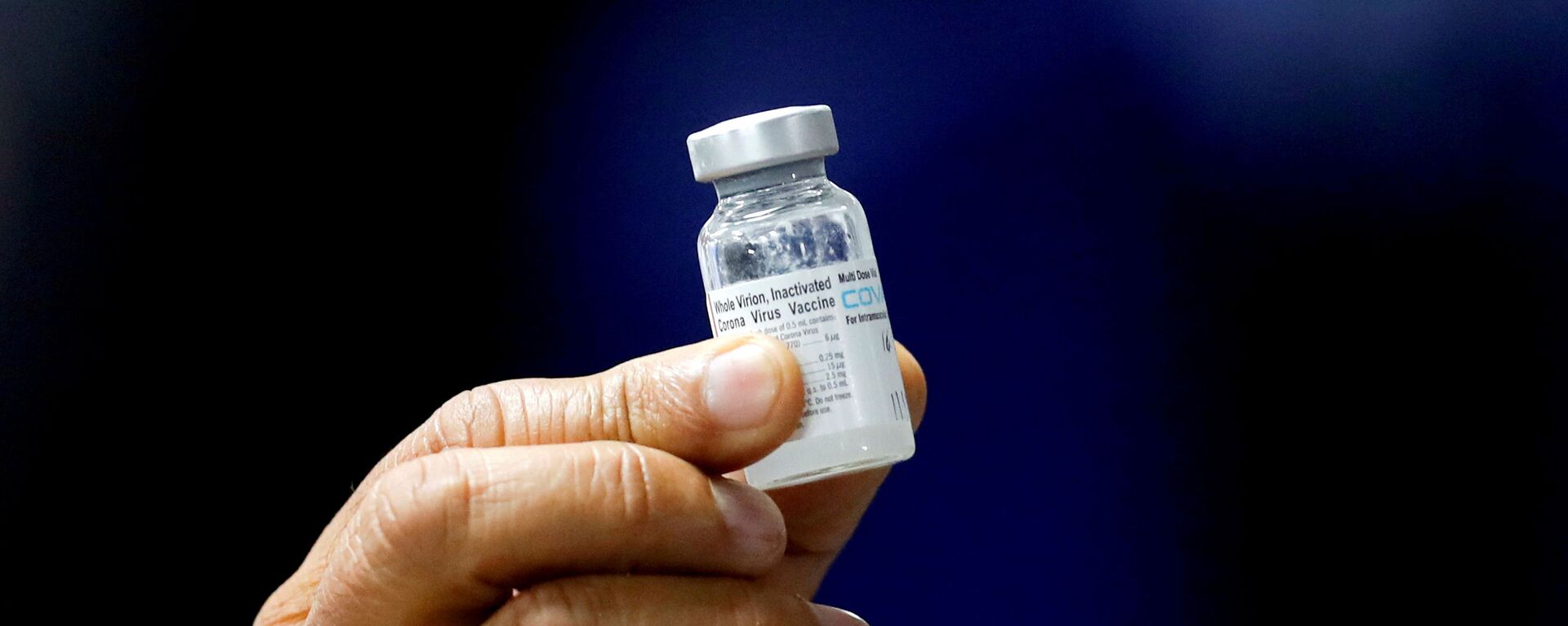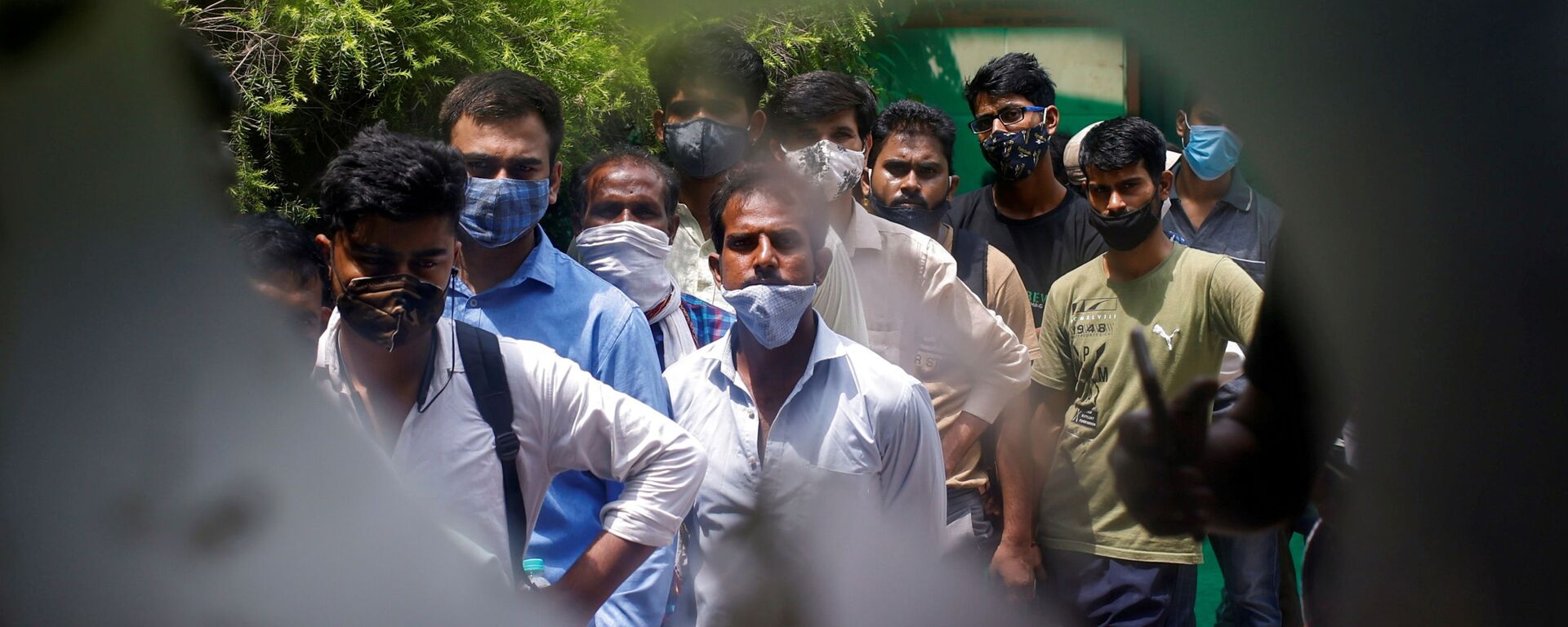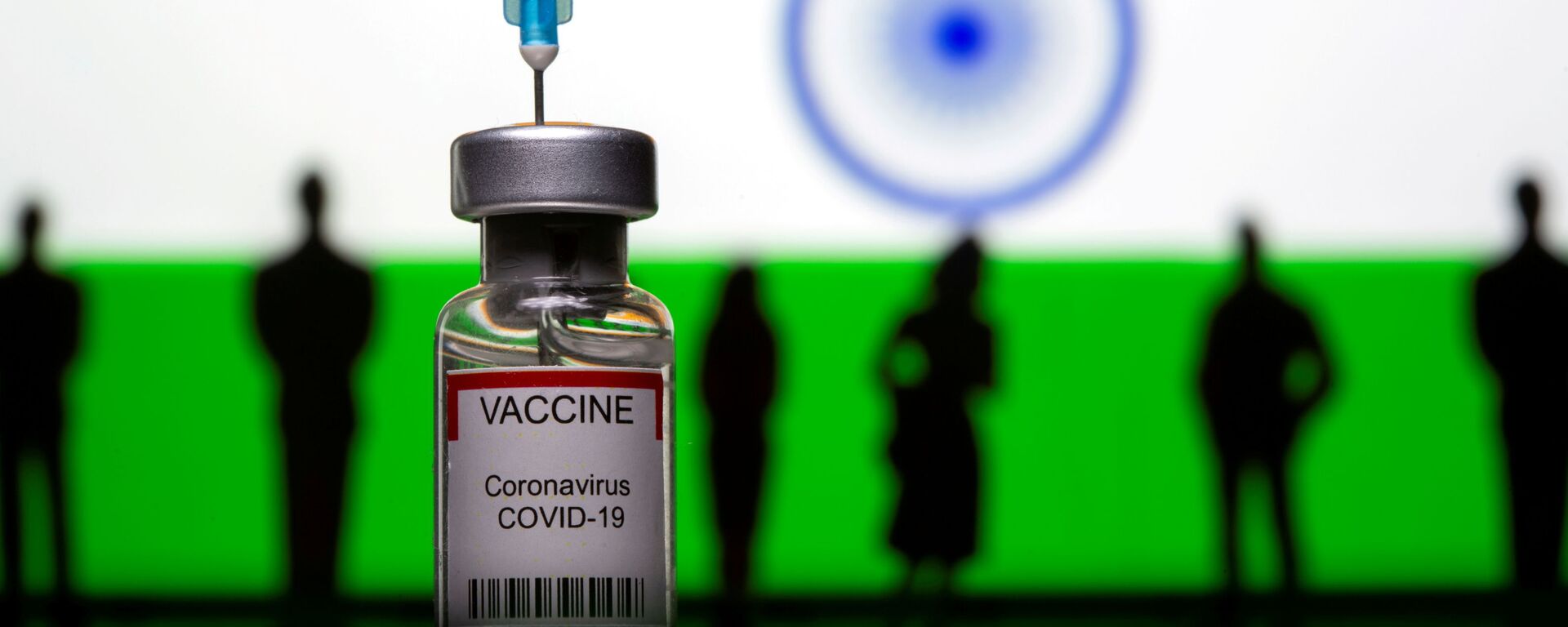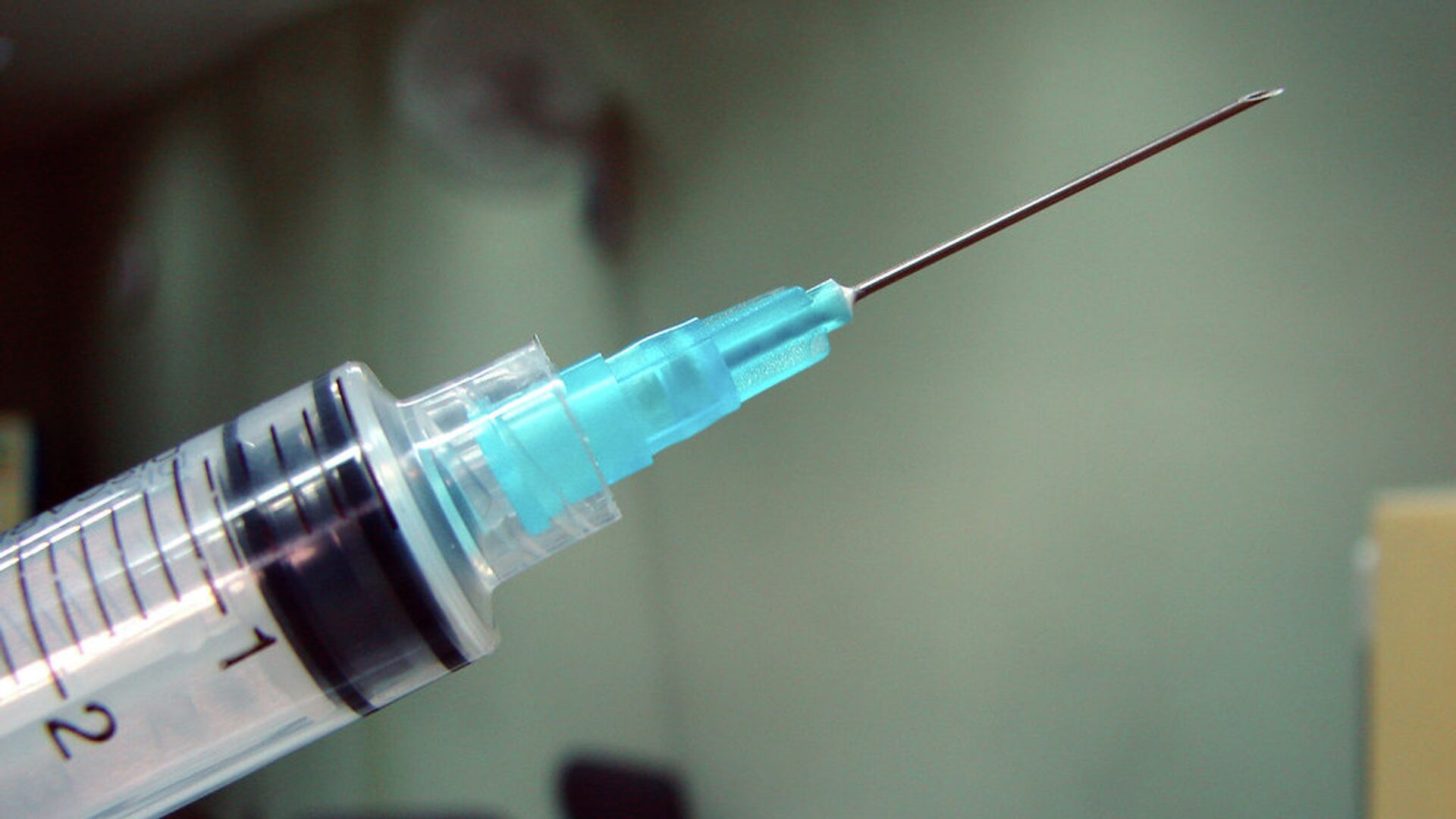https://sputnikglobe.com/20211111/as-who-warns-of-global-syringe-shortage-in-2022-is-india-ready-for-another-public-health-crisis-1090652185.html
As WHO Warns of Global Syringe Shortage in 2022, is India Ready for Another Public Health Crisis?
As WHO Warns of Global Syringe Shortage in 2022, is India Ready for Another Public Health Crisis?
Sputnik International
The WHO has warned that a "generation of children" may miss their scheduled immunisation doses because of a possible shortage of syringes, additionally... 11.11.2021, Sputnik International
2021-11-11T21:03+0000
2021-11-11T21:03+0000
2021-11-11T21:00+0000
world health organization (who)
vaccination
public health
healthcare
covid-19
https://cdn1.img.sputnikglobe.com/img/101668/66/1016686611_0:97:1024:673_1920x0_80_0_0_ea5491d8af5e8d831001fdb8e79b9a75.jpg
The World Health Organization (WHO) on Tuesday warned that there may be a global shortage of the one to two billion syringes needed to administer COVID-19 vaccinations next year. According to the global health agency, this shortage could affect routine immunisations while undermining needle safety. Hedman also emphasised that as the supply of COVID-19 vaccine doses increases, the stock of syringes must also keep pace. The WHO is concerned as a shortage could lead to delays in routine vaccinations, particularly for children, and other health services, and it may also instigate the practice of the unsafe reuse of syringes and needles, particularly in poorer countries. According to the WHO, around 6.8 billion COVID-19 vaccinations have been administered around the world, almost double the annual number of routine vaccines. During the meeting, Hedman highlighted that the world's total current manufacturing capacity is about 6 billion immunisation syringes a year."That means the world could face a shortage of up to two billion syringes next year, unless more factories are shifted to producing the right kind of device for shots. If we shift capacity from one type of syringe to another or attempt to expand capacity for specialised immunisation syringes, it takes time and investment," she said. What is Happening in India? India is considered one of the world's major producers of medical supplies. In recent months, however, Indian syringe makers have struggled to balance global and domestic commitments. Hindustan Syringes & Medical Devices (HMD), one of India’s largest syringe makers, manufactures an estimated 90 million injection devices suitable for Covid-19 vaccines every month according to media reports. But it also supplies the instrument for global vaccination programmes, which includes UNICEF.After this shortage became more prominent, the Indian government last month placed restrictions on the export of syringes and said that only 40 million units will be allowed to be exported in October and November, and then 90 million each in December and January. According to media reports, HMD claimed that it has diverted 100 million units from a UNICEF order for vaccination efforts within India. In an interview to an Indian news portal The Wire, HMD chairman and managing director Rajiv Nath said that the "global body had 'rapped' the company on the knuckles." Nath alleged that this crisis was "avoidable" if "India had placed orders in advance and had been transparent about the momentum of its vaccine rollout". Concerns over a syringe shortage have loomed since September, as India's COVID-19 vaccination drive surged from a daily average of 5.5 million doses in August, to 7.8 million in September. This includes the largest-single day spike, of 25 million doses, on Indian Prime Minister Narendra Modi's birthday. According to experts, the syringe shortage in India and their restriction on exports may affect global immunisation for both COVID and other diseases, as well as contribute to a possible global scarcity. 'India - A Key Global Syringe Supplier' Industry experts told Sputnik that supplies of syringes from India are important especially for the inoculation of children in low- and middle-income countries. Reportedly, its products vary in size from 0.1 millilitres to 3 millilitres. India used the 0.5 ml auto-disposable (AD) syringe to innoculate citizens with Covishield and Covaxin. This specification is recommended by WHO to prevent the transmission of diseases like HIV and hepatitis.Per media reports, India's export restrictions may particularly affect programmes targeting diseases like measles, mumps, rubella, and hepatitis among children. According to a report by Scroll.in, syringe manufacturing companies had written letters to India's Health Ministry to allow the use of conventional disposable syringes in the COVID-19 vaccination programme which began in January. Since 2005, India has been using auto-disable syringes for its mass vaccination programmes. In their letter, manufacturers informed the Indian government that the country is not "capable" of producing the amount of auto-disable syringes needed for the COVID-19 vaccination drive. No improvement in the current situation has occurred. Hiremath also noted difficulty in procuring syringes from leading syringe brands. "Dispovan, one of the major syringe brands, has suddenly become unavailable because of increased exports. Adding to it, long Deepavali holidays have affected production to a great extent," he added. Scroll.in reported that after the vaccination drive intensified in July, the Indian government invited bids for 1.25 billion auto-disable syringes. It did not get enough bidders, however, and subsequently placed a single order for 100 million syringes. In the same month, the government relaxed the bidding criteria for companies manufacturing conventional syringes, inviting bids of over $12,082,000. The orders were reportedly too late, however, as companies had already sealed export deals with other countries. Syringes from India are exported to 149 countries and export curbs have become a cause for concern. India has at least 20 syringe makers capable of producing over 500 million syringes on a monthly basis. Manufacturers have claimed that they have raised their output since last year. Last month, UNICEF Executive Director Henrietta Fore said in a statement that by the end of 2022 humanity could face a serious shortage of COVID vaccine syringes with "potentially dire consequences for the global effort to bring the pandemic under control".
https://sputnikglobe.com/20211103/who-approves-emergency-use-of-indias-covaxin-vaccine-1090445016.html
https://sputnikglobe.com/20210917/india-eyes-record-vaccination-on-pm-modis-birthday-but-opposition-observes-it-as-unemployment-day-1089146000.html
https://sputnikglobe.com/20211021/india-hails-historic-one-billion-covid-vaccination-milestone-in-nine-months-1090089362.html
Sputnik International
feedback@sputniknews.com
+74956456601
MIA „Rosiya Segodnya“
2021
Sushmita Panda
https://cdn1.img.sputnikglobe.com/img/07e5/05/12/1082926186_0:0:2048:2048_100x100_80_0_0_4474d0d7e27a36878eb8727832be74b4.jpg
Sushmita Panda
https://cdn1.img.sputnikglobe.com/img/07e5/05/12/1082926186_0:0:2048:2048_100x100_80_0_0_4474d0d7e27a36878eb8727832be74b4.jpg
News
en_EN
Sputnik International
feedback@sputniknews.com
+74956456601
MIA „Rosiya Segodnya“
Sputnik International
feedback@sputniknews.com
+74956456601
MIA „Rosiya Segodnya“
Sushmita Panda
https://cdn1.img.sputnikglobe.com/img/07e5/05/12/1082926186_0:0:2048:2048_100x100_80_0_0_4474d0d7e27a36878eb8727832be74b4.jpg
world health organization (who), vaccination, public health, healthcare, covid-19
world health organization (who), vaccination, public health, healthcare, covid-19
As WHO Warns of Global Syringe Shortage in 2022, is India Ready for Another Public Health Crisis?
The WHO has warned that a "generation of children" may miss their scheduled immunisation doses because of a possible shortage of syringes, additionally triggering the reuse of syringes, which, even through the use of modern sterilization techniques, is potentially dangerous.
The World Health Organization (WHO) on Tuesday warned that there may be a global shortage of the one to two billion syringes needed to administer COVID-19 vaccinations next year.
According to the global health agency, this shortage could affect routine immunisations while undermining needle safety.
"National health authorities should plan their needs well in advance to avoid the hoarding, panic buying, and type of situation seen early in the pandemic with the lack of personal protective equipment," Lisa Hedman, WHO's senior advisor on access to medicines and health products, said.
Hedman also emphasised that as the supply of COVID-19 vaccine doses increases, the stock of syringes must also keep pace.
The WHO is concerned as a shortage could lead to delays in routine vaccinations, particularly for children, and other health services, and it may also instigate the practice of the unsafe reuse of syringes and needles, particularly in poorer countries.
According to the WHO, around 6.8 billion COVID-19 vaccinations have been administered around the world, almost double the annual number of routine vaccines.
During the meeting, Hedman highlighted that the world's total current manufacturing capacity is about 6 billion immunisation syringes a year.

3 November 2021, 12:21 GMT
"That means the world could face a shortage of up to two billion syringes next year, unless more factories are shifted to producing the right kind of device for shots. If we shift capacity from one type of syringe to another or attempt to expand capacity for specialised immunisation syringes, it takes time and investment," she said.
What is Happening in India?
India is considered one of the world's major producers of medical supplies. In recent months, however, Indian syringe makers have struggled to balance global and domestic commitments.
Hindustan Syringes & Medical Devices (HMD), one of India’s largest syringe makers, manufactures an estimated 90 million injection devices suitable for Covid-19 vaccines every month according to media reports. But it also supplies the instrument for global vaccination programmes, which includes UNICEF.
After this shortage became more prominent, the Indian government last month placed restrictions on the export of syringes and
said that only 40 million units will be allowed to be exported in October and November, and then 90 million each in December and January.
According to media reports, HMD claimed that it has diverted 100 million units from a UNICEF order for vaccination efforts within India.
In an interview to an Indian news portal The Wire, HMD chairman and managing director Rajiv Nath said that the "global body had 'rapped' the company on the knuckles."
Nath alleged that this crisis was "avoidable" if "India had placed orders in advance and had been transparent about the momentum of its vaccine rollout".
Concerns over a syringe shortage have loomed since September, as India's COVID-19 vaccination drive surged from a daily average of 5.5 million doses in August, to 7.8 million in September. This includes the largest-single day spike, of 25 million doses, on Indian Prime Minister Narendra Modi's birthday.

17 September 2021, 07:11 GMT
According to experts, the syringe shortage in India and their restriction on exports may affect global immunisation for both COVID and other diseases, as well as contribute to a possible global scarcity.
'India - A Key Global Syringe Supplier'
Industry experts told Sputnik that supplies of syringes from India are important especially for the inoculation of children in low- and middle-income countries.
Reportedly, its products vary in size from 0.1 millilitres to 3 millilitres.
India used the 0.5 ml auto-disposable (AD) syringe to innoculate citizens with Covishield and Covaxin. This specification is recommended by WHO to prevent the transmission of diseases like HIV and hepatitis.
Per media reports, India's export restrictions may particularly affect programmes targeting diseases like measles, mumps, rubella, and hepatitis among children.
According to a report by Scroll.in, syringe manufacturing companies had written letters to India's Health Ministry to allow the use of conventional disposable syringes in the COVID-19 vaccination programme which began in January.

21 October 2021, 06:19 GMT
Since 2005, India has been using auto-disable syringes for its mass vaccination programmes. In their letter, manufacturers informed the Indian government that the country is not "capable" of producing the amount of auto-disable syringes needed for the COVID-19 vaccination drive. No improvement in the current situation has occurred.
"India is an exporter of syringes. There has been a spike in demand for Indian-made syringes overseas these days. Owing to an increase in export orders syringe manufacturers too have ramped up their manufacturing capacity. This has led to a crisis of syringe in domestic markets which has impacted hospitals greatly," Dr. Jagadish Hiremath, chairman at Aasra Hospitals told Sputnik.
Hiremath also noted difficulty in procuring syringes from leading syringe brands.
"Dispovan, one of the major syringe brands, has suddenly become unavailable because of increased exports. Adding to it, long Deepavali holidays have affected production to a great extent," he added.
Scroll.in reported that after the vaccination drive intensified in July, the Indian government invited bids for 1.25 billion auto-disable syringes. It did not get enough bidders, however, and subsequently placed a single order for 100 million syringes.
In the same month, the government relaxed the bidding criteria for companies manufacturing conventional syringes, inviting bids of over $12,082,000. The orders were reportedly too late, however, as companies had already sealed export deals with other countries. Syringes from India are exported to 149 countries and export curbs have become a cause for concern.
India has at least 20 syringe makers capable of producing over 500 million syringes on a monthly basis. Manufacturers have claimed that they have raised their output since last year.
Last month, UNICEF Executive Director Henrietta Fore
said in a statement that by the end of 2022 humanity could face a serious shortage of COVID vaccine syringes with "potentially dire consequences for the global effort to bring the pandemic under control".







